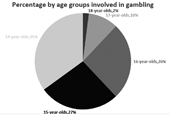Survey on gambling among teenagers
By Levan Abramishvili
Tuesday, April 16




The GRAPC, with the support of Tbilisi City Hall, visited several schools and held lecture-seminars where they discussed the damaging and devastating results to which gambling leads. Alongside the lectures at the schools, the organization conducted a study about the children’s involvement in gambling.
The study was conducted in 10 schools in different districts of Tbilisi. 500 students from ages 14-18 participated, 55% of them were boys and 45% were girls. The survey was anonymous, so the students had a chance to be honest. According to Guga Beselia, 48% of the students are involved in gambling. (See the table)
As the chart shows, the numbers are alarming and according to Beselia, the worst is that, with age, the students' addiction increases. From just 28% at the age of 14, the number of gamblers increases to 52% at 15. (See the chart)
In the survey, schoolchildren were also asked where they got the information about gambling games. It was evident that they heard about games from multiple sources, 75% of them answered that they received info from online ads and 47% from the billboards.
It is noteworthy that even though the study is very alarming and gives us the glimpse of the very prevalent problem within the Georgian youth, a survey of a larger scale should be done both within Tbilisi and in the regions to get the full picture of the reasons that the youth turns to gamble.
Almost half of the students that were surveyed are vulnerable to acquire ludomania, a condition that gives people the urge to gamble continuously despite harmful negative consequences.
The GRAPC study also pens out recommendations. First of all, the lectures should be carried out throughout the country to raise awareness about the adverse outcomes of gambling. According to the law, teens under 18 aren’t allowed to gamble. But the results of the study show that the law is mostly disregarded. Most of the surveyed students were avid users of online gambling platforms. GRAPC notes that there are almost no barriers that stop children from accessing such websites, which results in the high usage of online gambling games in teens.
The study mentions that the Gambling Research And Prevention Centre is currently working on a draft law, which ensures regulating two things:
• The registration to online gambling platforms should become stricter. One solution would be access to the public registry. If the online casinos were allowed to have access to the public registry, it would ensure that underage children won’t be able to register.
• The advertising also requires regulating. It is unacceptable that we see massive billboards near schools that promote gambling. Ads on TV and the internet should also be regulated. Since there are no requirements or set principles in this regard, vulnerable children become easy targets for online casinos.
It is worth mentioning that, earlier this month, a draft law that was to prohibit advertising of gambling games was discussed at the parliament. Even though the majority of the members were in favor of the regulations, the law was still not adopted. The reason for this was that several norms were unacceptable for most of the MPs, including the banning of gambling billboards in the radius of 200 meters near education facilities. The initiative belongs to Levan Gogichaishvili; he only got the support of 42 of his colleagues.
The results of the study should concern to both the government and the parents of teenagers. Extensive public awareness campaigns, as well as the competent legislature, is immediately needed to protect the future generations from the damaging effects of gambling.
